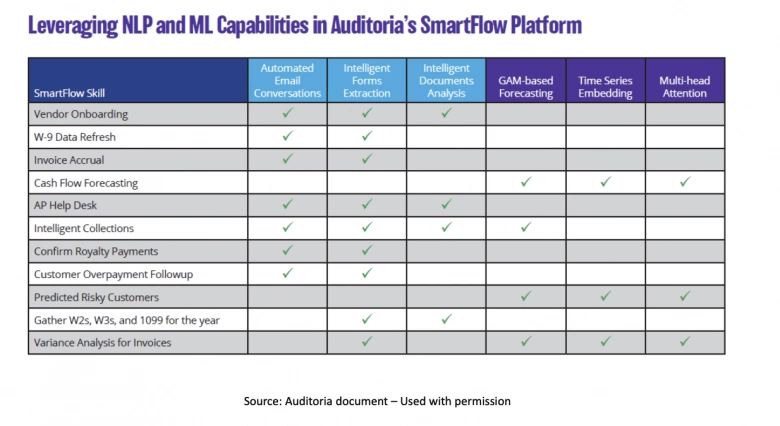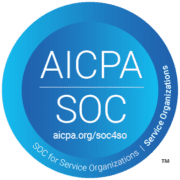on September 8, 2021
Auditoria
It’s interesting to see how a new vendor sees this changing landscape. For that, Auditoria aims to plug productivity and insight gaps in the back office. Their focus can also provide valuable insights into what shared services organizations should be considering.
One exhibit of Auditoria’s shows a number of ‘skills’ or new autonomous applications available from their SmartFlow platform (see below).
Auditoria has spent time learning the ‘taxonomy’ of leading ERP solutions. Why? This helps customers quickly connect Auditoria to their ERPs and it speeds time to value. It sees its bots as being ‘pretrained on process hygiene’. I like the concept and customers definitely want apps not just a pile of tools or a bare-bones platform. One focus area, according to Auditoria founder Rohit Gupta is “cash performance as an asset.” This looks across a company’s value chain to find ways to improve forecasts, reduce losses/fraud, etc. So, like the BASF anecdote at the top of the piece, Auditoria isn’t going to make the old-school apps found in ERP software. They’ll make those old apps more valuable/better with Auditoria’s new apps – apps that add value today.
My take
I have yet to meet a CEO, CFO or CIO who wants to upgrade or replace their ERP software unless there’s simply no choice. Why the reluctance? An ERP replacement project:
- Is often risky.
- Often creates processes and outcomes little changed from the current system.
- Can be very costly and end up costing much more than the company, integrator and/or vendor estimated.
- Can disrupt current operations, customers, orders, etc.
- May not deliver benefits for some time.
- Is often very time consuming.
- Etc.
Newer solutions, ones that complement (not replace) the existing ERP, may be a better alternative as they:
- Go in quickly.
- Don’t require the huge effort that an ERP replacement would require.
- May be lower risk to implement.
- Deliver very different kinds of net-new value.
These new tools/apps have a new vernacular: autonomous, intelligent, self-driving, low-code … Some of that may be marketing hyperbole while much of it may be fact. You’ll need to judge each accordingly.
But beyond the coolness of the new tech involved, there’s a very practical or pragmatic reason we all need to pay attention to these new solutions. The world realities now are much more volatile. Businesses cannot afford the cost, time and risk to re-implement or change ERPs with every new regulation, new business model, M&A event, pandemic triggered change, new generation of worker, improvements in consumer tech, etc.
The world got more volatile and businesses need tech to be more dynamic. That’s the new world and old ERP has a role in it albeit a different one than before. Old ERP will work in the new world but it needs to be supplemented with powerful new capabilities that add current, relevant value. It’s time to re-think ERP.




